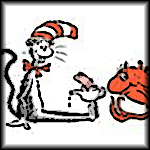Abstract
When I set out writing this assignment, the intent was to create an activity for students that was fun but offered them insight into how to understand and apply Mills's concept of the sociological imagination. One of the most challenging things for students in an introductory sociology course is to step outside their way of making sense of the world and...Download this resource to see full details. Download this resource to see full details.
Details
- Subject Area(s):
- Introduction to Sociology/Social Problems
- Resource Type(s):
- Assignment
- Class Level(s):
- College 100
- Class Size(s):
- Any
Usage Notes
I begin the discussion of the assignment with words of wisdom from my 3-year-old son, who believes Dr. Seuss's The Sneetches, is about "being mean and snooty." Indeed, it is about being mean and snooty, but I relate to the class that the larger, more sociological view clearly points to a treatise on discrimination, prejudice, power, and stratification. We...Download this resource to see full details. Download this resource to see full details.
Learning Goals and Assessments
Learning Goal(s):
- Goal 1: To help students develop their sociological imagination.
- Goal 2: To familiarize students with how sociological concepts and ideas can be applied to elements of material culture that they may take for granted.
- Goal 3: To facilitate the development of critical thinking skills.
Goal Assessment(s):
- Assessment 1: Students will display an understanding of the sociological imagination in their paper. By clearly defining the concept in their own words, and applying it to Dr. Seuss, students will demonstrate their own sociological imagination at work.
- Assessment 2: Students will define and apply a minimum of three sociological terms in the paper. While they can select any terms from the course, they must demonstrate an appropriate application to receive full credit for the assignment.
- Assessment 3: Overall performance on the paper will be used to assess critical thinking. Also, students will explain whether or not Dr. Seuss can be viewed as a sociologist, defending their assessment using evidence from their analysis.
When using resources from TRAILS, please include a clear and legible citation.


